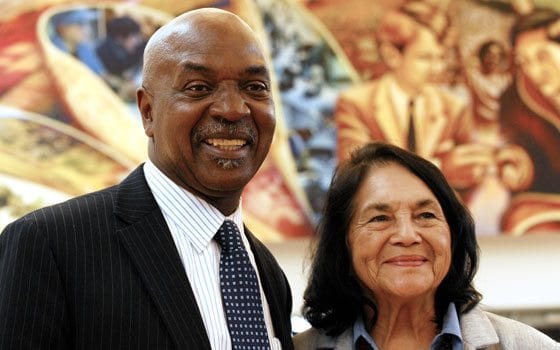
Last Sunday marked the 43rd anniversary of the assassination of Sen. Robert F. Kennedy. He was gunned down during the early morning hours of June 5, 1968, immediately after he had claimed victory in the California Democratic presidential primary at the Ambassador Hotel in Los Angeles.
A transformative leader who may well have become president, Kennedy fell victim to the violence and hatred that he spoke out against so eloquently during the final months of his life.
Anniversaries of tragic events can reopen old wounds, or they can become opportunities for remembering, healing and moving forward. The Charles Hamilton Houston Institute for Race and Justice, the ACLU and Death Penalty Forum of California sought to accomplish the latter when they jointly hosted a community event, entitled “Faith Rising,” on Sunday in the Paul Schrade Library of the RFK Community School in Los Angeles.
The RFK Community School was built on the site of the Ambassador Hotel after it was demolished in 2005. The library is located where the hotel kitchen had been — the exact spot of Kennedy’s murder.
Kennedy was a man of faith and of the law. From both perspectives, featured speakers Harvard Law professor Charles J. Ogletree Jr., Rev. Eugene Rivers and Bishop Charles Blake of West Angeles Church of God in Christ held a discussion with hundreds of attendees about the death penalty, racial inequities in our current criminal justice system and community justice — all issues which RFK was passionate about .
Kennedy once said, “As long as there is plenty, poverty is evil.” He simply could not understand how a nation as prosperous and generous as ours could tolerate such need within our midst.
Yet, he was no “bleeding heart liberal.” The top law enforcement officer in the country for four years, he could be hard-nosed about fighting crime. But he recognized the links between poverty, violence and lawlessness.
He understood how souls are destroyed when there is no hope, no opportunity and no way out. Without making excuses for individual actions and responsibilities, he insisted that government play an active and positive role in helping those in need. As senator of New York, he was the driving force behind an effort to revitalize Bedford-Stuyvesant. Decades before the founding of the critically acclaimed Harlem Children’s Zone, Kennedy created a model for a public/private corporation that brought jobs, housing, recreation and culture to one of the poorest neighborhoods of Brooklyn.
It is hard not to believe that Kennedy would be appalled at our nation’s bloated prison system; its disproportionate targeting of the young, the poor and the non-white; public investments that favor jails over schools; and at mean-spirited rhetoric that blames individuals, rather than policies and structures, for being poor.
He once took his fellow senators to task over a welfare bill that seemed “to punish the poor because they are there and we have not been able to do anything about them … We will never succeed in restoring dignity and promise to the lives of people … until we develop a system which provides jobs …”
Kennedy’s views on the death penalty evolved over the years. By 1968, he signaled his support for abolition, stating that when a human life is taken either “in the name of the law or in defiance of the law … the whole nation is degraded.”
He was also a pragmatist who could not abide government waste. We can only imagine how he might have railed against budget proposals that dramatically cut basic social services and education even as they keep intact a capital punishment system that accomplishes little in the way of public safety, yet devours millions of dollars in state and federal funds per year. Fundamentally, he would have understood the need to reorient national priorities toward enhancing life over taking life.
Georgetown Law professor and former RFK aide, Peter Edelman, wrote of his boss: “His work and his views were prescient. It is still not too late to learn from them.”
Indeed, it is not. Last Sunday, the speakers and audience members considered the economic and social costs of maintaining the current criminal justice system. They discussed how funds allocated for capital punishment could be redirected to improve our schools, reduce high school dropout rates and treat substance abuse.
Those funds could also be redirected to pay for gang prevention programs, jobs for youths in the summer, better mental health and general health treatment, vocational training, pre-school and childcare programs, and programs like YouthBuild that help court-involved youths positively redirect their lives. All of these cost taxpayers less than the death penalty, and all are more effective in reducing crime and improving the quality of life in our communities.
On the night of Martin Luther King Jr.’s death, a deeply shaken Robert Kennedy spoke quietly and extemporaneously to a mostly black audience. He could have succumbed to despair and anger, or inflamed racial tensions. He could have vowed retribution and punishment. Instead he called forth our shared dreams.
“The vast majority of white people and the vast majority of black people in this country want to live together, want to improve the quality of our life, and want justice for all human beings who abide in our land,” Kennedy said.
As we remember the very sad month of June 1968, let us continue to seek the newer and more gentle world RFK envisioned for all of us.
Johanna M. Wald, director of Strategic Planning, Charles Hamilton Houston Institute for Race and Justice, Harvard Law School.


![Banner [Virtual] Art Gallery](https://baystatebanner.com/wp-content/uploads/2024/04/Cagen-Luse_Men-at-store-e1713991226112-150x150.jpg)



